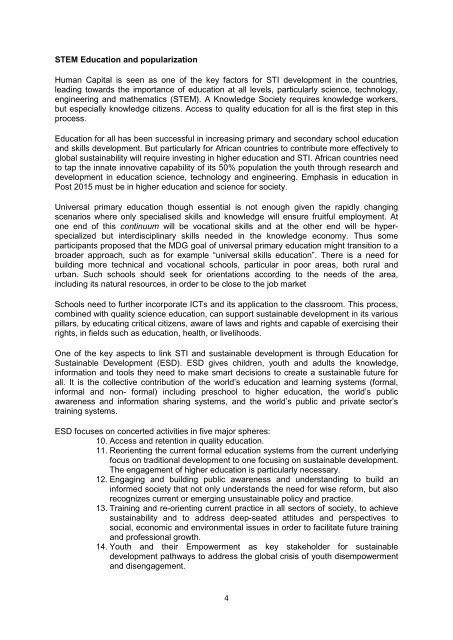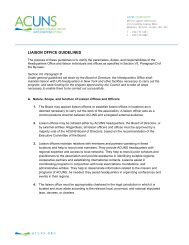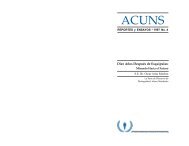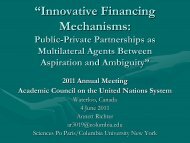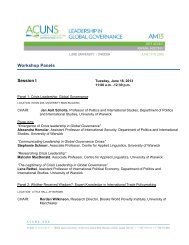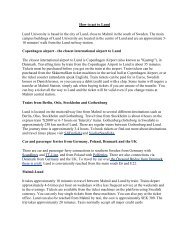E-discussion: Building the future we want with science ... - Unesco
E-discussion: Building the future we want with science ... - Unesco
E-discussion: Building the future we want with science ... - Unesco
You also want an ePaper? Increase the reach of your titles
YUMPU automatically turns print PDFs into web optimized ePapers that Google loves.
STEM Education and popularization<br />
Human Capital is seen as one of <strong>the</strong> key factors for STI development in <strong>the</strong> countries,<br />
leading towards <strong>the</strong> importance of education at all levels, particularly <strong>science</strong>, technology,<br />
engineering and ma<strong>the</strong>matics (STEM). A Knowledge Society requires knowledge workers,<br />
but especially knowledge citizens. Access to quality education for all is <strong>the</strong> first step in this<br />
process.<br />
Education for all has been successful in increasing primary and secondary school education<br />
and skills development. But particularly for African countries to contribute more effectively to<br />
global sustainability will require investing in higher education and STI. African countries need<br />
to tap <strong>the</strong> innate innovative capability of its 50% population <strong>the</strong> youth through research and<br />
development in education <strong>science</strong>, technology and engineering. Emphasis in education in<br />
Post 2015 must be in higher education and <strong>science</strong> for society.<br />
Universal primary education though essential is not enough given <strong>the</strong> rapidly changing<br />
scenarios where only specialised skills and knowledge will ensure fruitful employment. At<br />
one end of this continuum will be vocational skills and at <strong>the</strong> o<strong>the</strong>r end will be hyperspecialized<br />
but interdisciplinary skills needed in <strong>the</strong> knowledge economy. Thus some<br />
participants proposed that <strong>the</strong> MDG goal of universal primary education might transition to a<br />
broader approach, such as for example “universal skills education”. There is a need for<br />
building more technical and vocational schools, particular in poor areas, both rural and<br />
urban. Such schools should seek for orientations according to <strong>the</strong> needs of <strong>the</strong> area,<br />
including its natural resources, in order to be close to <strong>the</strong> job market<br />
Schools need to fur<strong>the</strong>r incorporate ICTs and its application to <strong>the</strong> classroom. This process,<br />
combined <strong>with</strong> quality <strong>science</strong> education, can support sustainable development in its various<br />
pillars, by educating critical citizens, aware of laws and rights and capable of exercising <strong>the</strong>ir<br />
rights, in fields such as education, health, or livelihoods.<br />
One of <strong>the</strong> key aspects to link STI and sustainable development is through Education for<br />
Sustainable Development (ESD). ESD gives children, youth and adults <strong>the</strong> knowledge,<br />
information and tools <strong>the</strong>y need to make smart decisions to create a sustainable <strong>future</strong> for<br />
all. It is <strong>the</strong> collective contribution of <strong>the</strong> world’s education and learning systems (formal,<br />
informal and non- formal) including preschool to higher education, <strong>the</strong> world’s public<br />
awareness and information sharing systems, and <strong>the</strong> world’s public and private sector’s<br />
training systems.<br />
ESD focuses on concerted activities in five major spheres:<br />
10. Access and retention in quality education.<br />
11. Reorienting <strong>the</strong> current formal education systems from <strong>the</strong> current underlying<br />
focus on traditional development to one focusing on sustainable development.<br />
The engagement of higher education is particularly necessary.<br />
12. Engaging and building public awareness and understanding to build an<br />
informed society that not only understands <strong>the</strong> need for wise reform, but also<br />
recognizes current or emerging unsustainable policy and practice.<br />
13. Training and re-orienting current practice in all sectors of society, to achieve<br />
sustainability and to address deep-seated attitudes and perspectives to<br />
social, economic and environmental issues in order to facilitate <strong>future</strong> training<br />
and professional growth.<br />
14. Youth and <strong>the</strong>ir Empo<strong>we</strong>rment as key stakeholder for sustainable<br />
development pathways to address <strong>the</strong> global crisis of youth disempo<strong>we</strong>rment<br />
and disengagement.<br />
4


